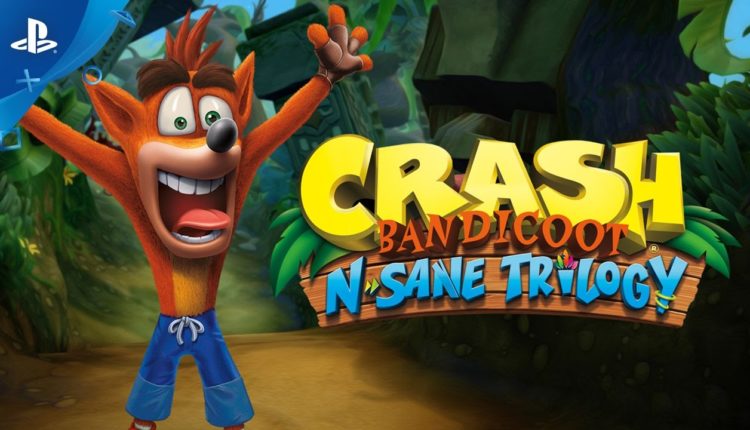Rebooting the Bandicoot | Crash’s Successful Return.
Given the unending tidal wave of increasingly redundant “HD” re-releases – I think we can all agree that BioShock collection was taking the piss – the incredible success of the N.Sane Trilogy, on a single platform release no less, is sure to guarantee if nothing else the continuation of this trend to just keep re-releasing titles on the current generation of consoles. However, Crash’s success does present an unusually fertile jumping off point. The problem with major studios in gaming as much as in film is that they’ll often take the wrong lesson from a success. For example when The Avengers made objectively all of the money, all the major studio began gearing up for their own cinematic universes, not quite grasping that people just liked seeing the Avengers together, not the act of combining various IP into one big-budget marketing exercise. And that’s where the success of Crash Bandicoot leaves us in an interesting spot, because there’s several ways they could build on it.
http://https://www.youtube.com/watch?v=r5yAjgP2vnM
Firstly, there’s the aforementioned “just keep doing more of this” which there’s little else to say on as it’s already happening (seriously, upgraded versions of the Arkham games?? They’re not even as old as all those young people who are objectively Too Young to exist). The next possibility is the potential for new, but backwards-looking, Crash games. This would be a wise move on their part. It’s always been a strong, beloved and surprisingly persistent IP even though most everyone agrees there’s not been a good Crash game since maybe the start of the PS2 era. The excitement for Mighty No 9 showed that when it comes to Mega Man, people just wanted a shinier version of old Mega Man, not a fancy modern take. Sonic similarly has suffered from an eye-watering number of different interpretations – so desperate did they get that he was a werewolf, sorry, werehog at one point – since the original games, almost all of which have been reviled. The most recent entry, Sonic Mania being perhaps the best received in several decades, and what is it? Basically a sequel to the original with a few additions and crisper visuals made in the original style. Now, these are primarily examples of eighties properties and while that nostalgia train has been chugging steadily along, it is with some mild disgust that we must admit to ourselves that it may be the nineties turn to join in.
Short-term, the possibility for this wider trend is further straight re-releases/remakes of nineties properties. Indeed this is already well underway with remakes of fan-favourites like Resident Evil 2 and Final Fantasy VII currently deep into their production cycles but these are franchises that never really went away. The more interesting possibility is the series’ that died off or became unrecognizable from their initial runs. Spyro being probably the most obvious example with talks of a similar remake trilogy for that popping up very quickly after the Crash sales figures started coming in. (Personally the lack of any movement on a MediEvil revival has me sick to my stomach; easily one of the best and most unique IP’s of its era.) This all seems geared toward laying the groundwork for new Crash/Spyro/etc. in the form or sequels, or more likely, soft reboots. With experiences and settings – and therefore graphics – being the most recognisable aspects of the biggest games of the current era – your Call of Duty and Assassin’s Creeds, say – a return to the more mascot-focused era of gaming would likely be welcomed by the major studios for ease of branding/marketing reasons.

If there’s an unplanned, fringe benefit to this whole practice of re-releasing, it’s that it’s providing a short term solution to a very real issue in gaming as a medium. Unlike films, games aren’t easily archived due to the multiple different platforms and ports. Not to mention the redundancy of each generation’s console once a new one emerges and less and less backwards compatibility; gaming’s past is functionally lost to us every few years. While constant, upgraded re-releases are far from a viable method, it does for now at least provide a certain amount of preservation of history within the medium. Yet even here, the scale of the problem is only further demonstrated.
When it came time to release the Silent Hill HD collection, they realised that they didn’t possess a complete source code for the games, having instead to partially rebuild and alter the engine while recreating sections of the game from nothing. Crash faced similar issues with the developers essentially recreating the game from scratch with nothing but level geometry to build from. And though the N. Sane Trilogy is a very faithful remake, you need only look at the many articles written about the change of engine with its accompanying alteration to the character’s hit-box to realise that this is not a proper 1:1 recreation of the original experience any more than a shot-for-shot remake of a classic film would be a worthy substitute for the original. But it still provides an accessible method for new audiences to experience old games and the discussion regarding gaming’s preservation of its own history is a topic for another day.
The scale and conversation-dominating level of the success of the N. Sane Trilogy took some by surprise it seems. There’s no doubt discussions are being had amongst the shady heads of the major studios on how best to capitalise on it and while the potential is there for something interesting to emerge, this being the video games industry, it’s best to assume the most cynical, least consumer-focused and most nakedly financially-advantageous route will be the one they take… But if nothing else, the suddenly remembered punishing difficulty of Crash Bandicoot led to some wonderful mashup Dark Souls memes. And really, in this era of witty twitter, reference humour snobbery; that’s all you could ask for.

